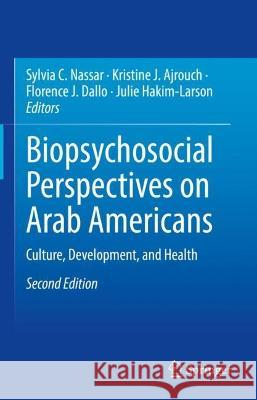Biopsychosocial Perspectives on Arab Americans, 2nd Edition: Culture, Development, and Health » książka
Biopsychosocial Perspectives on Arab Americans, 2nd Edition: Culture, Development, and Health
ISBN-13: 9783031283598 / Angielski
Biopsychosocial Perspectives on Arab Americans, 2nd Edition: Culture, Development, and Health
ISBN-13: 9783031283598 / Angielski
(netto: 651,74 VAT: 5%)
Najniższa cena z 30 dni: 616,85
ok. 16-18 dni roboczych.
Darmowa dostawa!
Culture, Development, and Health
The biopsychosocial study of Arab Americans continues to uncover compelling insights into theoretical and applied initiatives. This book, like the first edition, is uniquely divided into three distinct yet interwoven sections – culture, psychosocial development, and health and disease. Though the United States Office of Management and Budget (OMB) legally classifies Arab Americans as White, there is growing evidence to suggest that Arab American experiences do not mirror overall White experiences, and, as such, are increasingly recognized as a distinct and important group. In keeping with this recognition, in 2023 the OMB proposed the inclusion of a Middle Eastern and North African (MENA) racial/ethnic category on the decennial US Census. It is a label that is broader than Arab American (those with ancestry from one of the 22 Arab League states) as it includes the non-Arab countries of Turkey, Israel and Iran. Yet, the MENA category holds enormous promise for accurately identifying Arab Americans at the population level. Notably, the population of Arab Americans is growing in number. Coupled with the current tenure of xenophobia and exposed structural racism in the US, clinical and community practitioners must be attuned to their clients of Arab ancestry, as well as the nuances of their developmental and health concerns. This second edition provides a rich overview of critical topics in an updated and contemporary relevant context. The audience for the text includes counselors, social workers, psychologists, nurses, psychiatrists, sociologists, and any other public and mental health practitioners, researchers, and policy makers who work with and on behalf of clients and patients of Arab descent. The editors represent a team of leading experts spanning disciplines of sociology, clinical mental health, and community public health. "This edition draws on leading experts in Arab American health and sociology who document the complexity of this population's immigration and acculturation experience. It offers critical and current research that speaks to the centrality of context and diversity in treating Americans of Arab descent. Contributors explore the complex and limited racial framework within which Arabs in the U.S. form their identities, and the impact of structural racism on their lives and health. This collection offers practitioners much needed insights on a population often hidden or rendered invisible by data limitations, and yet misrepresented by cultural stereotypes." Helen Hatab Samhan, Former Executive Director, Arab American Institute/Foundation. "Nassar, Ajrouch, Hakim-Larson, and Dallo’s breakthrough work in the area of culturally competent health care has been inspiring across interdisciplinary fields and to the communities they serve. Their work on Arab American health issues, in particular, has greatly improved clinical practice at the community and national levels. I heartily recommend taking the time to become familiar with their important body of work and this latest text."Ismael Ahmed, Former Michigan State Director of Health and Human Services.











